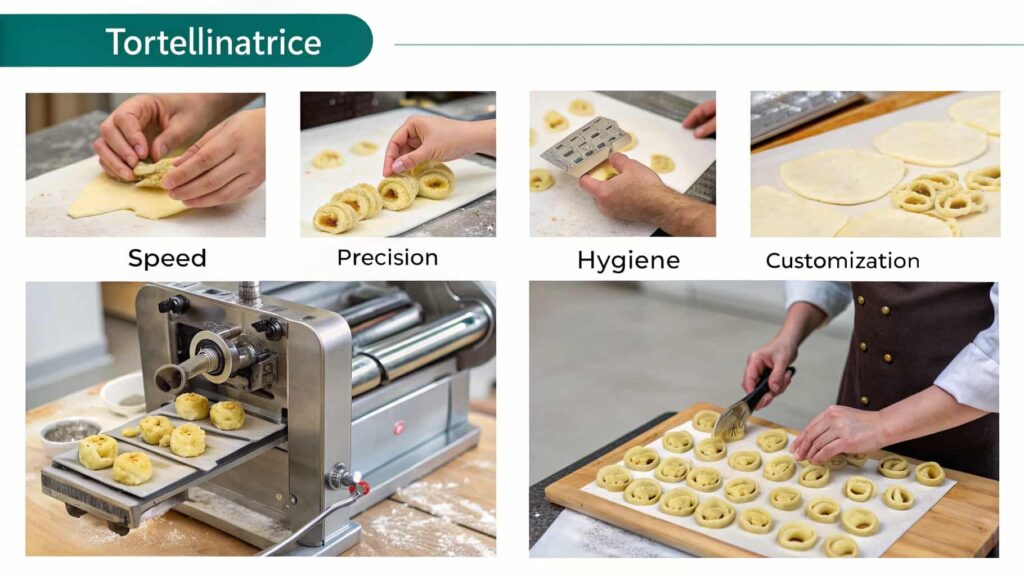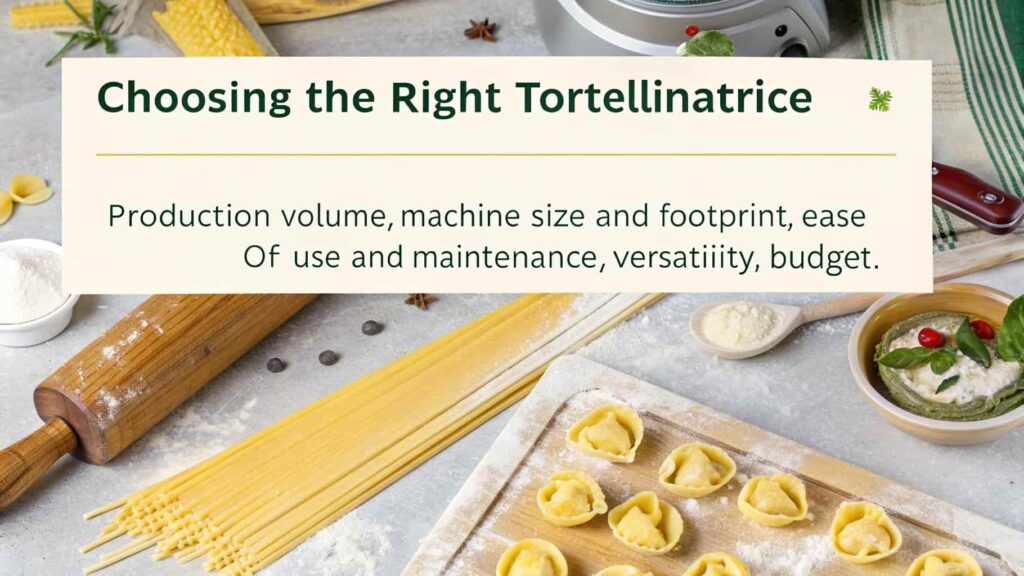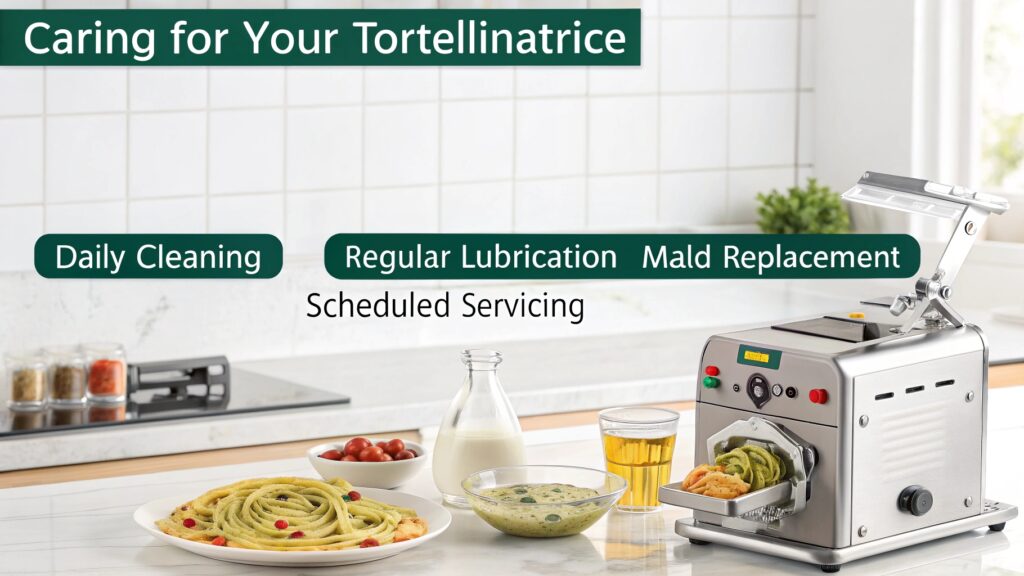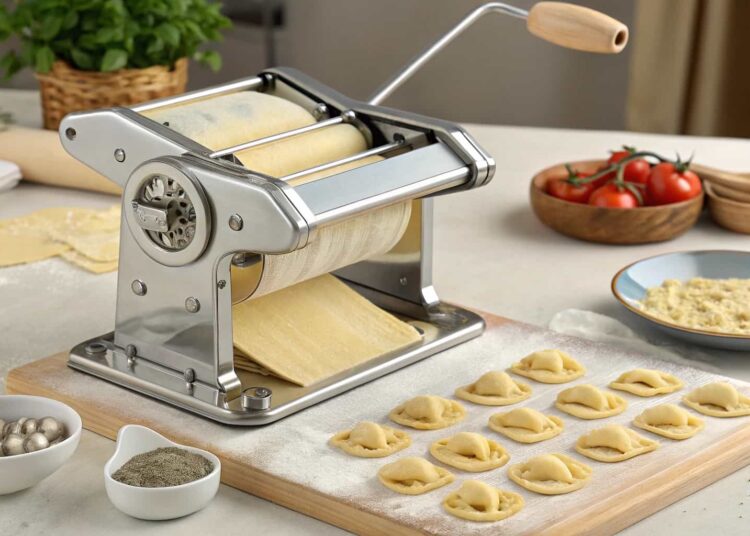Tortellini, the iconic stuffed pasta of Italy’s Emilia-Romagna region, has captivated pasta lovers for generations. Traditionally handcrafted by nonnas with practiced precision, tortellini has seen a culinary evolution thanks to an innovative tool: the tortellinatrice.
This specialized machine has revolutionized pasta-making in both artisanal kitchens and industrial settings. Whether you’re a small-scale chef, an ambitious restaurant owner, or a pasta enthusiast curious about automation, understanding the tortellinatrice opens a world of culinary creativity, efficiency, and tradition preserved through technology.
What Is a Tortellinatrice?
A tortellinatrice is a mechanical or automated machine designed specifically to make tortellini. It streamlines the process of shaping, filling, and sealing this popular stuffed pasta.
These machines vary in size and complexity—from compact manual versions suitable for restaurants or catering businesses to large-scale industrial models capable of producing thousands of tortellini per hour.
Why Use a Tortellinatrice?
While hand-making tortellini is a labor of love, it’s time-consuming and labor-intensive. A tortellinatrice offers several advantages:

1. Speed and Efficiency
Making tortellini manually can be slow, especially when preparing large batches. A tortellinatrice can produce hundreds or thousands of pieces per hour, ensuring consistency and faster turnaround times.
2. Precision
The machine guarantees uniform shape, size, and filling-to-pasta ratio—something that even skilled hands might not achieve consistently.
3. Hygiene
Using a tortellinatrice minimizes hand contact with the pasta, maintaining a more hygienic production process, especially in commercial kitchens.
4. Customization
Modern tortellinatrici allow you to customize shapes, sizes, and fillings—ranging from traditional meat and cheese to modern vegan or gourmet creations.
The History of Tortellinatrice
The concept of automating pasta-making has roots in Italy’s post-war industrial boom, when food production needed to scale up to meet growing demands. Early versions of pasta machines were rudimentary, but by the 1960s and 1970s, Italian engineers had introduced specialized machines like the tortellinatrice.
These machines were engineered not just for productivity but also to preserve the traditional form and texture of tortellini. Over time, their precision and output improved, making them a staple in pasta factories and even high-end restaurants.
Also read: Speedyshort.Com
How Does a Tortellinatrice Work?
Though models vary, most tortellinatrici follow a similar process:
1. Dough Sheeting
The machine flattens the dough into thin sheets. The desired thickness can be adjusted depending on the recipe.
2. Filling Deposit
The filling—whether meat, cheese, mushrooms, or spinach—is deposited in precise amounts along the dough sheet.
3. Cutting and Folding
A blade cuts the dough into squares or circles, and the machine folds and seals the tortellini with remarkable precision, mimicking hand-folded techniques.
4. Output and Collection
The finished tortellini are placed on a conveyor belt or tray, ready for drying, freezing, or immediate cooking.
Types of Tortellinatrice Machines
Depending on your needs, there are various types of tortellinatrice machines:
1. Manual Tortellinatrice
Ideal for small restaurants or pasta shops. These require some manual intervention and are usually crank-operated or foot-pedal based.
2. Semi-Automatic Tortellinatrice
Great for mid-sized businesses, semi-automatic machines require manual dough or filling placement but automate cutting and shaping.
3. Fully Automatic Tortellinatrice
Perfect for industrial-scale production. These high-capacity machines handle everything—from dough sheeting to finished tortellini output—with minimal human supervision.
4. Customizable Multi-Pasta Machines
Some high-end tortellinatrici are versatile, capable of producing multiple pasta types with interchangeable molds and dies.
Choosing the Right Tortellinatrice
Selecting the right tortellinatrice depends on your specific needs. Here are key factors to consider:

1. Production Volume
How many tortellini do you need to produce daily? Small units can make 10–30 kg/hour, while industrial machines can go beyond 100 kg/hour.
2. Machine Size and Footprint
Evaluate your kitchen or factory space. Compact models are space-efficient, while industrial units need dedicated space and ventilation.
3. Ease of Use and Maintenance
Look for user-friendly controls and easy-to-clean components. Stainless steel parts are ideal for hygiene and durability.
4. Versatility
Some models can make ravioli, cappelletti, or agnolotti by changing dies or heads—great for diverse menus.
5. Budget
Prices can range from a few hundred euros (for manual models) to tens of thousands (for fully automatic industrial versions).
Popular Brands and Models
Some of the most trusted brands producing high-quality tortellinatrici include:
- La Monferrina – Renowned for compact, durable machines perfect for artisan pasta shops.
- Pama Roma – Offers industrial-level machines with excellent automation and durability.
- Bottene – Known for versatile pasta machines suitable for tortellini and other filled pasta.
- Dominioni Punto&Pasta – Specializes in customizable pasta equipment with advanced technology.
Always verify customer reviews, after-sales service, and spare parts availability before purchasing.
Also read: Zola Hospice Fraud
Recipes for Tortellinatrice Use
The beauty of the tortellinatrice lies in its versatility. Here are a few filling ideas that work perfectly with the machine:
1. Traditional Pork & Parmesan
- Pork loin
- Mortadella
- Parmigiano Reggiano
- Nutmeg
- Egg
2. Spinach & Ricotta (Vegetarian)
- Fresh spinach
- Ricotta cheese
- Grated nutmeg
- Salt and pepper
3. Gourmet Truffle Mushroom
- Mixed wild mushrooms
- White truffle oil
- Ricotta or goat cheese
- Herbs like thyme or parsley
Just ensure your filling is finely blended to avoid clogging the machine.
Caring for Your Tortellinatrice
Proper maintenance ensures the longevity of your tortellinatrice. Here are some basic tips:

1. Daily Cleaning
Remove all dough and filling residues after each use. Use food-safe cleaning solutions.
2. Regular Lubrication
Some moving parts need periodic lubrication. Check your manufacturer’s guide.
3. Mold Replacement
Keep extra molds on hand in case of wear and tear, especially in high-volume settings.
4. Scheduled Servicing
Industrial models benefit from yearly service checks to ensure optimal performance.
ortellinatrice in Home Kitchens
While tortellinatrici are more common in commercial settings, some passionate home cooks invest in smaller models to elevate their pasta-making. Brands like Imperia and Marcato offer manual machines with tortellini attachments for home use.
They offer:
- Greater control over ingredients
- Fresh pasta anytime
- Fun for family cooking activities
Also read: Looking for an Omega Indexer Alternative
Eco-Friendly and Sustainable Pasta Making
Modern tortellinatrici are also evolving to meet environmental standards. Manufacturers are focusing on:
- Energy efficiency
- Low-waste production
- Food-grade recyclable components
Combined with local, organic ingredients, the tortellinatrice can become a cornerstone of a sustainable pasta-making operation.
Tortellinatrice and the Revival of Regional Cuisine
The rise of tortellinatrici is not about replacing traditional handcrafting but preserving it through scale. Restaurants and pasta shops across the globe are now reviving old family recipes, bringing authentic Italian flavors to global audiences—without compromising on quality or authenticity.
Future of Tortellinatrice: Smart Pasta Machines?
With the emergence of smart kitchens and IoT integration, future tortellinatrici could feature:
- App-based controls
- AI to adjust filling consistency
- Smart portion calibration
- Cloud-connected production analytics
This blend of tradition and innovation points toward a bright future for pasta-making.
Conclusion:
Whether you’re a chef reviving old-world traditions, a startup entering the food industry, or a manufacturer scaling up production, the tortellinatrice is an indispensable tool. It preserves the soul of Italian cuisine while embracing the speed and precision of modern technology.
With the right machine, a pinch of creativity, and quality ingredients, you can deliver exceptional tortellini—one perfect bite at a time.
FAQs About Tortellinatrice
1. What is the main function of a tortellinatrice?
A tortellinatrice automates the process of making tortellini, handling tasks like dough sheeting, filling, folding, and sealing.
2. Can a tortellinatrice make other types of pasta?
Yes, many models come with attachments or molds for ravioli, agnolotti, or cappelletti.
3. Is a tortellinatrice suitable for home use?
Some compact or manual models are designed for home kitchens, especially for pasta enthusiasts.
4. How much does a tortellinatrice cost?
Prices vary from €500 for manual models to €20,000+ for industrial machines.
5. Is it difficult to clean a tortellinatrice?
Not at all—most machines are designed for easy disassembly and cleaning. Regular maintenance is essential for hygiene and performance.
6. What materials are used in tortellinatrice machines?
Typically, stainless steel and food-grade plastic are used for durability and cleanliness.
7. Can I use fresh fillings like spinach or seafood?
Yes, but fillings must be finely chopped and not too moist to avoid clogging or sealing issues.
8. How fast can a tortellinatrice produce tortellini?
Industrial machines can produce thousands per hour, while smaller ones make 10–30 kg/hour.
9. Do I need special training to use a tortellinatrice?
Most machines are user-friendly. Manufacturers often provide training or manuals to get you started.
10. Where can I buy a tortellinatrice?
They’re available from culinary equipment suppliers, Italian manufacturers, and online platforms like Alibaba, eBay, or direct brand websites.
Related post:
















